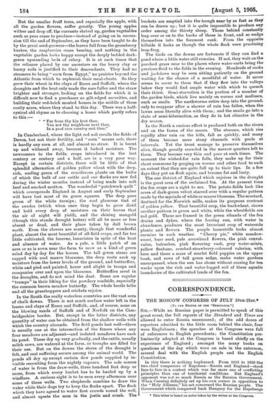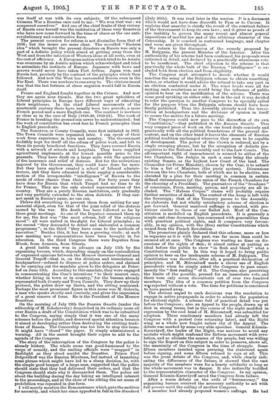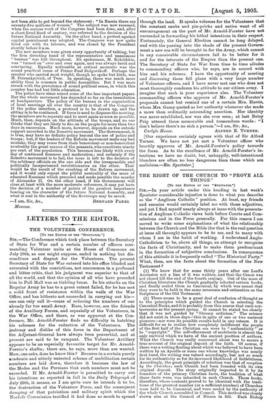[To THR EDITOR OF THE "SPECTATOR."]
Sin.—While no Russian paper is permitted to speak of this
THE MOSCOW CONGRESS OF JULY 19TR-218T.*
• This letter is based on notes taken by the writer at the Congress.
great event, the full reports of the Standard and Times are allowed to enter Russia uncensored; of the odd dozen of
reporters admitted to the little room behind the chair, four were Englishmen ; the speeches at the Congress were full of references to English precedents; the Constitution pre- liminarily adopted at the Congress is based chiefly on the experience of England ; amongst the many books on questions of the day which were on sale in the anteroom, several deal with the English people and the English Constitution.
In this there is nothing haphazard. From 1815 to 1856 the two chief conquerors of Napoleon—Russia and England—stood face to face in a contest which was far more one of conflicting principles than one of territorial conditions. But England's opponent was not so much Russia as the Russian Government. When Canning definitely set up his own corner in opposition to the "Holy Alliance," his act concerned the Russian people. The Government which conquered back Hungary for the Hapsburgs The present occasion for reform is not dissimilar from that of 1856; but the issues are more clear. The so-called "Eastern idea" which brought the present disasters on Russia was only a part of a definite policy which aimed at getting away from the
West and from the infection of Western ideas at all costs, even at the cost of efficiency. A European nation which tried to be Asiatic was overcome by an Asiatic nation which acknowledged and tried to assimilate the instincts of Europe. Japanese with bows and arrows would never have taken Port Arthur. Japan won, and Russia lost, precisely by the contrast of the principles which they followed. And now the West has surrounded Russia even in the Far East. There was nowhere to run away to. The obvious moral wag that the last fortress of sheer negation would fall in Russia itself.
France and England fought together in the Crimea. And now they are again near friends. But the two great upholders of Liberal principles in Europe have different ways of educating their neighbours. In the chief Liberal movements of the nineteenth century there have usually been two periods, a more French period and a more English one. The contrast is nowhere so clear as in the case of Italy (1848-49, 1859-61). The work of France in breaking the ground can never be underestimated ; but the work of constitution has owed less to French principles than to English precedents.
The Zemstvos, or County Councils, were first initiated in 1865. The Town Councils were organised later. I can speak of their work irom experience in town and country. The Government foolishly kept for itself all the odium of police work, and left to them its purely beneficent functions. They have covered Russia with a network of schools and hospitals. They have supplied agricultural implements at the lowest possible price to the .peasants. They have dealt on a large scale with the questions of fire insurance and relief of distress. But for the restrictions imposed by the Government, they could have done far more. But they have anyhow created a school of Liberal adminis- trators, and they have educated in their employ a considerable section of the irresponsible " intelligence " of Russia to the needs of other classes than their own. For forty years they have done for Russia that which Turgot had no time to do for France: They are the only elected representatives of the country. They are a purely Russian institution, only gradually and very partially extended to the alien districts. If they can- not speak in Russia's name, no one can.
Plehve did everything to prevent them from uniting for any material object, even for that of the joint relief of the distress caused by the war. His death has been followed so far by three great meetings. As one of the Deputies summed them up for me, the first was "the most solemn, full of the religious mood": all were united in the .fight for Liberal principles ; in the second "they descended to detail and elaborated a common programme"-' in the third "they have come to the methods of execution." Besides this, it has been a growing circle : at each new meeting new representatives have been brought in for education. In the third Congress there were Deputies from Minsk, from Armenia, from Siberia.
A great battle was won in advance on July 15th by the organising bureau, which, depending simply on the contradiction of expressed opinions between the Moscow Governor-General and General Trepoff—that is, on the divisions and irresolution at headquarters—refused to disperse at police orders, and claimed to be carrying out the mandate given to the delegates at Peter- hof on June 19th. According to this mandate, they were engaged in communicating the Czar's intentions "to their nearest ones, whether living in town or in country," for the bureau already represented both County and Town Councils. They drew up their protocol, the police drew up theirs, and the sitting continued. Perhaps the most prominent figure in this scene was M. Golovin, a man who speaks shortly and concisely, and gives the impression of a great reserve of force. He is the President of the Moscow Zemstvos.
On the morning of July 19th the Russian Gazette (under the editorship of M. Sobolyevsky) despatched in its ordinary issue all over Russia a draft of the Constitution which was to be submitted to the Congress, saying simply that it was one of the many schemes before the public, and deserved special attention because it aimed at developing rather than destroying the existing tradi- tions of Russia. The Censorship was too late to stop the issue. It might have " closed " the paper. It simply administered a warning. All in the secret brought their copies to add to the agenda of the Congress.
The story of the interruption of the Congress by the police is already history. The whole scene was good-humoured to the verge of comedy, and the smiliwr'. officials were " snapped " in flashlight as they stood amidst the Deputies. Prince Paul Dolgortikoff was the Russian Mirabeau, but instead of launching some phrase which might have led to a sharp decision, he, with the simple good temper of a large man, suggested that the police should state that they bad delivered their orders, and that the Congress should state why it disregarded them. The police sat 'about the building during the day taking an intelligent interest in the proceedings, and at the close of the sitting the set scene of prohibition was repeated in due form.
I will merely mention the Remonstrance which gave the motives for assembly, and which has since appeated in full in the Standard (July 26th). It was read later in the session. P is a document which would not have done discredit to Pym or to Cavour. It explains that anarchy is chiefly the result of the constant failure of the Government to keep its own laws ; and it gives as proofs of the inability to govern the many recent and almost general impositions of martial law and of the arbitrary character of the Censorship. It is couched in restrained language, and chapter and verse are given throughout.
We return to the discussion of the remedy proposed by M. Bulyguin, the present Minister of the Interior. After the authenticity of his scheme had been confirmed, his proposals were criticised in detail, and declared by a practically unanimous vote to be insufficient. The chief objection to the scheme is that practically the whole bulk of the Russian "intelligence" is ex- cluded both from election and from eligibility. The Congress next attempted to 'decide whether it would sanction the using of the Bulyguin scheme to obtain something better, or whether it would advise the refusal to take any part in an election conducted under it. The wiser heads were all for making such resolutions as would bring the influence of public opinion to bear on the Modification of the scheme. There was some good speaking on either side ; but in the end it was decided to refer the question to another Congress to be specially called for the purpose when the Bulyguin scheme should have been finally published. Thus the Assembly cleverly used the irreso- lution at headquarters and the divisions of opinion in itself to secure the motive for a future meeting.
The Congress could now pass to the discussion of its own "Constitution,"—that published in the Russian Gazette. This very compact piece of work on the one hand deals concisely and practically with all the political foundations of the present dis- content, and on the other hand it leaves the elements of Russian political tradition unchanged wherever they seem to be capable of development. The power of the Crown is reduced, not by a single sweeping phrase, but by the arrogation of definite pre- rogatives to the National Assembly and to the Law Courts. The all-important right of impeachment is secured to either of the two Chambers, the Judges in such a case being the already existing Senate, as the highest Law Court of the land. The Chancellor (or Prime Minister), chosen by the Czar, is to submit to him a list of Ministers (the party system). Dissensions between the two Chambers, both of which are to be elective, are obviated by a plan for their meeting in common in certain defined circumstances (cf. the union of French Chambers for the choosing of a President). The guarantees of the " freedoms " of conscience, Press, meeting, person, and property are all in- cluded. The "Habeas Corpus" clause will probably require further securities of detail. The control of the Army is left with the Sovereign ; that of the Treasury passes to the Assembly. An elaborate but not wholly satisfactory scheme of election is put forward. General manhood suffrage is enacted, with pi-o- visions similar to those of our Ballot Act. Most of the Con- stitution is modelled on English precedents. It is generally a simple and clear document, less concerned with generalities than with practical political rights, and it compares very favour- ably, in my opinion, with the (five) earlier Constitutions which issued from the French Revolution.
The promoters plainly declared that this scheme, more or less in sequence as it is with the past, was far more than could be secured all at once. The Congress was wasting no time on dis- cussions of the rights of man ; it aimed rather at putting an ideal before the public to show "in flesh and blood" what a Constitution could be. In this way it hoped to bring public . opinion to bear on the inadequate scheme of M. Bulyguin. The Constitution was therefore, after all, a practical declaration of principles, and M. Miiromtseff made a clever use of English precedents when he simply asked the Congress to pass unani- mously the "first reading" of it. The Congress, also perceiving the limits of the possible, pressed for an immediate vote, and there were only seven dissentients out of over two hundred members. The idea of a common petition from the Congress wzis rejected without a vote. The time for petitions is considered to have passed away.
The obvious sequel to such decisions was the resolution to engage in active propaganda in order to educate the population for electoral rights. A scheme full of practical detail was put before the Congress ; also an Appeal to the people, drawn up at first in strong terms, but in the course of the night modified in expression by the cool head of M. Miiromtseff, was submitted for adoption. Three reactionary members had already left the Congress with a protest (one returning later), and the Right wing as a whole now fought rather shy of the Appeal. The debate was marked by some very able speeches. General Ktismin- Karavayeff, the leader of the Right, was anxious to avoid any mistake which might confound the Reform movement with revo- lution, and so alienate the masses of the people, but was willing to sign the Report on this subject in order to preserve, above all, the unanimity of the Congress in the time of struggle. Some fifteen members insisted upon perusing the statement again before signing, and some fifteen refused to sign at all. This was the great debate of the Congress, and, while clearly indi- cating the differences of the future, it showed that the vast majority of the members were for a hearty solidarity so long as the whole movement was in danger. It also indirectly testified to the representative character of the Congress. In my opinion, General Ktismin-Karavilyeff saved the Congress from failure.
After a warm debate on the evils of "bureaucracy," the organising bureau received the necessary authority to act with full powers until the calling of another Congress.
A member had already proposed women's suffrage. He had not been able to get beyond the statement: "In Russia there are seventy-five millions of women." The subject was now resumed, when the serious work of the Congress had been done, and, after a short-lived flood of oratory, was referred to the decision of the future National Assembly. On the other hand, a protest against capital punishment was adopted. The Congress was now quite tired out with its labours, and was closed by the President shortly before 3 a.m.
The new members were given every opportunity of talking, but the firm directing hand of the representative and unanimous " bureau " was felt throughout. Its spokesman, M. RokOshkin, was "turned on" over and over again, and was always lucid and convincing. Equally noticeable at critical moments was the sound practical sense of Prince Paul Dolgoriikoff. Perhaps the speaker who carried most weight, though he spoke but little, was
M. Petrunkyevich, of Tver. In speaking, there was much more ability than is common in public Assemblies. But I was more struck with the prevalence of sound political sense, in which this country has had but little education.
The police have since seized some of the less important papers. But the whole movement has depended so far on the irresolution at headquarters. The policy of the bureau in the organisation of local meetings all over the country is that of the Congress. If the police interfere, a protocol is to be drawn up, and the sitting is to be continued. If force is used to disperse the meeting, the members are to separate and to meet again as soon as possible. Much, then, depends on the attitude of the troops, and no one thinks that they are likely to fire on the people for more than two days in succession. Much more, however, depends on the outside support accorded to the Zemstvo movement. The Government, it is true, may have no definite policy beyond the use of police and troops; but, if the leaders of the Reform movement make any bad mistake, they may rouse from their benevolent or non-benevolent neutrality the great masses of the peasants, who constitute ninety per cent, of the population. This becomes less likely with every day of continued firmness and moderation; and certainly if the Zemstvo movement is to fail, the issue is left to the decision of the arbitrary officials on the one side and the irresponsible and politically inexperienced revolutionaries on the other. That would be the result of the crushing of the Reform movement, and it would only repeat the pitiful neutrality of the mass of educated Russians which preceded and made possible the murder of Alexander II. On the other hand, if the Government will close at least with the more moderate reformers, it may yet have the decision of a number of points of the greatest importance bearing on the character of the future National Assembly, and what is real in the authority of the Sovereign may be saved.
am, Sir, &c., BERNARD PARES.








































 Previous page
Previous page